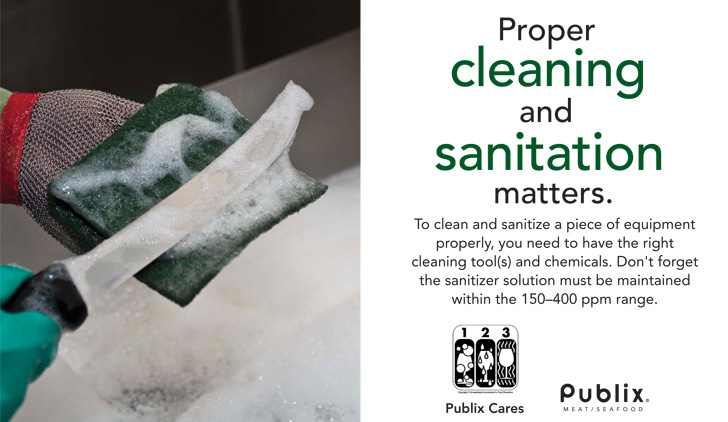
Annually, foodborne illnesses result in one in six Americans getting sick. Know the food safety risk factors in each department, and help prevent foodborne illnesses by always following the appropriate food safety processes.
Some proactive measures — like handwashing, properly calibrating thermometers and using the correct chemicals to clean utensils and food preparation surfaces — are the same across all departments. But there are also department-specific risks to be aware of and prevent.
Inadequate cooking
Not every department cooks, but for those that do, it’s important to make sure food is cooked properly every time. Associates should probe cooked or baked product with a food thermometer to verify it has reached its required internal temperature. Keep plenty of alcohol wipes on hand to clean the food thermometer before and after each use.
Improper hot and cold holding
Hot foods must be kept at 140 F or above, and cold foods must be kept at 40 F or below to avoid entering the temperature danger zone. Bacteria grows quickly between 40 and 140 F, so it’s important to chill or heat foods quickly to avoid being within this range long. Keep refrigerated and hot cases clean, operational and at the correct holding temperature.
Cross contamination
Starting with a clean and sanitized work area is the first step in preventing cross contamination, but it’s not the only one. Keep raw foods separate from ready-to-eat foods during storage and preparation. All departments are responsible for cleaning equipment, utensils and food contact surfaces like tables and cutting boards. Associates working in fresh departments should be aware of potential food allergies and take extra precaution when handling or preparing products containing milk, egg, peanut, tree nut, fish, shellfish, soy and wheat. Cleaning chemicals should be stored away from any food or food contact surfaces.
Poor personal hygiene
Associates can help eliminate poor personal hygiene as a risk factor by frequently washing their hands and only working with food when they’re healthy. Although wearing clean gloves is a requirement when touching ready-to-eat food, microorganisms can still spread to food if your hands aren’t clean. The Centers for Disease Control and Prevention reports handwashing is one of the most important steps we can take to avoid getting sick and spreading germs to others. So, remember to wash your hands thoroughly before putting on a new pair of gloves.
It’s also important to wear a clean uniform and apron. Make sure hair is completely restrained in a hairnet, and never eat, drink or chew gum while in food preparation areas.
For more information, review or ask your manager to print the department-specific lists of food safety risk factors located on Publix Connection > Store > Audits, Inspection and Certification.
Annually, foodborne illnesses result in an estimated 128,000 hospitalizations and about 3,000 preventable deaths.


